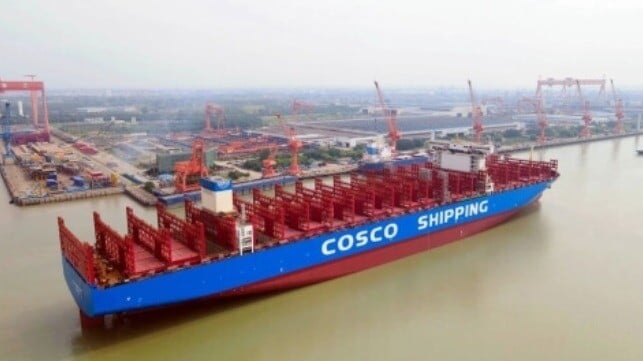China Pushes Back on U.S. Port Fee Proposal

China is pushing back hard on the White House's proposal for port fees on Chinese tonnage, which would make it much more expensive for specific classes of vessel to call in the U.S. The fees would make American port calls uneconomical for Chinese owners and operators, who would face charges that would peak at $140 per net ton per visit to the United States.
"The US measures fully expose the unilateralist and protectionist nature of its policies," said China's commerce ministry in a statement Friday. "They seriously harm the legitimate rights and interests of Chinese companies, disrupt the stability of the global supply and production chain, violate World Trade Organization rules, and undermine the rules-based multilateral trading system and international economic and trade order."
The China Shipowners' Association (CSA) joined in, urging the U.S. to stop all "discriminatory measures" and abide by global trade rules. The association also rejected USTR's accusations of unfair competition.
Chinese ownership is not the only target of the fee structure; it is primarily aimed at Chinese shipbuilders, and any Chinese-built ship is subject to charges. If not owned by Chinese interests, any laden Chinese-built ship would be charged $50 per net ton per visit to the U.S. - or, for container ships, $120 per import container discharged (if a higher dollar value). Compared to USTR's previous proposal, this is relatively affordable, and has been well-received in some corners of the liner industry. And with a new exemption for vessels on a ballast voyage, Chinese-built tankers, LNG carriers, offshore service vessels and bulkers may be able to escape the charge altogether when arriving empty in the U.S., as these vessel classes often do.
Though these fees are much lower than initially proposed, the China Association of National Shipbuilding Industry (CANSI) hit back at the announcement of charges targeting its members' products, calling the USTR's proposal a trade rule violation and a threat to the development of international shipping.

that matters most
Get the latest maritime news delivered to your inbox daily.
Car carriers built anywhere outside of the U.S. - whether in China, Korea, Japan or Europe - would also be subject to a flat charge of $150 per car equivalent unit of capacity, even when arriving empty. For a large car carrier arriving at an East Coast port, this implies an additional fee of more than $1 million for every visit. American exporters of roll-on/roll-off cargo would be affected, including U.S. OEMs like John Deere, Caterpillar, GM, Toyota and Mercedes, which all export vehicles from U.S. factories to the global market.
Vessels owned in the U.S. or enrolled in U.S. sealift subsidy programs are exempt from the fees, as are vessels on shortsea voyages.
